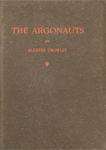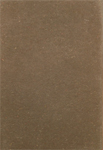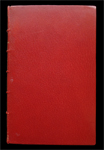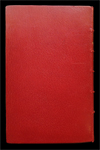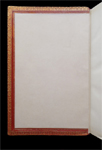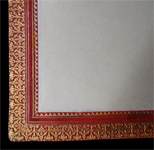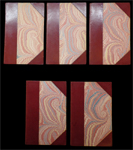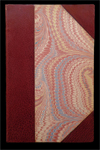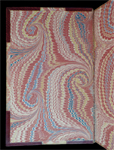100th
MP

|
THE
100th
MONKEY
PRESS |
|
|
|
Limited Editions by Aleister Crowley & Victor B. Neuburg |
|
Bibliographies |
|
Download Texts
»
Aleister
Crowley
WANTED !!NEW!!
|
|
THE ARGONAUTS |
|
Image Thumbnails |
||||||||||||||||||||||||||||||||||||||||||||||||||||||||||||||||||||||
|
Title: |
The Argonauts. |
|
||||||||||||||||||||||||||||||||||||||||||||||||||||||||||||||||||||
|
Variations: |
|
|||||||||||||||||||||||||||||||||||||||||||||||||||||||||||||||||||||
|
Publisher: |
Society for the Propagation of Religious Truth (S.P.R.T.).1 |
|||||||||||||||||||||||||||||||||||||||||||||||||||||||||||||||||||||
|
Printer: |
Chiswick Press: Charles Whittingham and Co., Tooks Court, Chancery Lane, London.1 |
|||||||||||||||||||||||||||||||||||||||||||||||||||||||||||||||||||||
|
Published At: |
Boleskine, Foyers, Inverness.1 |
|||||||||||||||||||||||||||||||||||||||||||||||||||||||||||||||||||||
|
Date: |
circa July1904. |
|||||||||||||||||||||||||||||||||||||||||||||||||||||||||||||||||||||
|
Edition: |
1st Edition. |
|||||||||||||||||||||||||||||||||||||||||||||||||||||||||||||||||||||
|
Pages: |
(vi + 18) (ii + 20) (ii + 20) (ii + 24) (ii + 23) + 1 page advertisements.3 Each Act is a separate play on the Greek model separately paginated.1 |
|||||||||||||||||||||||||||||||||||||||||||||||||||||||||||||||||||||
|
Price: |
Priced at 5 shillings.1 |
|||||||||||||||||||||||||||||||||||||||||||||||||||||||||||||||||||||
|
Remarks: |
The Argonauts was the first book published under Crowley's new publishing imprint, the Society for the Propagation of Religious Truth.4 |
|||||||||||||||||||||||||||||||||||||||||||||||||||||||||||||||||||||
|
Pagination:3 |
|
|||||||||||||||||||||||||||||||||||||||||||||||||||||||||||||||||||||
|
Contents: |
- The Argonauts - Actus Primus — Jason - Actus Secundus — Argo - Actus Tertius — Medea - Actus Quartus — Sirenae - Actus Quintus — Aries |
|||||||||||||||||||||||||||||||||||||||||||||||||||||||||||||||||||||
|
Author’s Working Versions: |
|
|||||||||||||||||||||||||||||||||||||||||||||||||||||||||||||||||||||
|
Other Known Editions: |
|
|||||||||||||||||||||||||||||||||||||||||||||||||||||||||||||||||||||
|
Bibliographic Sources: |
|
|||||||||||||||||||||||||||||||||||||||||||||||||||||||||||||||||||||
|
Comments by Aleister Crowley: |
While at Akyab I wrote Ahab, which, with a few other poems, was published as a companion to Jezebel. I had also, at odd times, continued Orpheus and The Argonauts. The latter play is really five separate plays of the Greek pattern. — The Confessions of Aleister Crowley. New York, NY. Hill and Wang, 1969. Page 273.
My activities as a publisher were at this time remarkable. I had issued The God-Eater and The Star & the Garter through Charles Watts & Co. of the Rationalist Press Association, but there was still no such demand for my books as to indicate that I had touched the great heart of the British public. I decided that it would save trouble to publish them myself. I decided to call myself the Society for the Propagation of Religious Truth, and issued The Argonauts, The Sword of Song, the Book of the Goetia of Solomon the King, Why Jesus Wept, Oracles, Orpheus, Gargoyles and The Collected Works. — The Confessions of Aleister Crowley. New York, NY. Hill and Wang, 1969. Page 406. |
|||||||||||||||||||||||||||||||||||||||||||||||||||||||||||||||||||||
|
Reviews: |
Mr. Crowley considers “The Argonauts” to consist of five acts, we should have said of five plays, dealing with the story of Jason and the Golden Fleece. Each begins with page 1, and is dedicated to a fresh batch of persons on the occasion of some event in the author’s life. The handsomest dedication is the last. It runs, “To Commonsense and to the Qabalists (sic), Clergymen, Peers, Alchemists, Subalterns, Sorcerers, Thieves, Necromancers, Missionaries, Lunatics, Doctors and Rosicrucian Prostitutes among whom I have lived (being in England), on the occasion of my going away.” Without admitting that residence in England is any excuse for so large a circle of acquaintance we may hope he will be happier at Boleskine, Foyers, Inverness. Inverness is, we believe, particularly free from Rosicrucians. Boleskine is, moreover, the headquarters of the Society for the Propagation of Religious Truth, which publishes the book, and may have insisted, as a condition of publication, that the characters should show some knowledge of Scripture. We wonder that while they were about it they did not strike out the advertisement of a book that the author has edited, entitled “Alice: an Adultery,” of which though out of print, a few copies may be had of the author at the famine price of a guinea. In the play itself all is modesty. Medea is as “severely proper” as Mrs. Kenwig herself. There is, indeed, more modesty than poetry. As early as page 5, the first of the five pages so numbered, we have the semi-chorus of Iolchian men complaining:
“Surely, O friends, at last ‘tis clear The man was mad indeed! Such nonsense we did never hear As this prophetic screed.”
This is the right butter woman’s rank to market. We think, too, that the men are rather hard on the prophet, whose talk seems to us neither better nor worse than that of some of the others. The best that can be said for the play is that it contains a few striking phrases and some happy lines, while some of the lyrics, after the manner of Swinburne, are almost too good for parodies. The play is to be commended to those only who have a sense of humour. —The Morning Post, 17 August 1904. ______________________________
We have received a curious volume, by Mr. Aleister Crowley, in the form of a poetic and lyrical drama in five acts. Mr. Crowley has written several volumes of verse, and has a fair poetic equipment, especially in the matter of technique. He has a smooth sweetness, a pleasant harmony, which he appears to have acquired by a study of the methods of Mr. Swinburne. His drama, in our opinion, is remarkable, less for its action than for its lyrics and for its dedications. Its lyrics are good, though we praise them with the reserve due to imitations. They are gentle flatteries of distinguished modern writers. No man has ever paid a more subtle tribute to the beauty of “Ave atque Vale” than the following, the Orpheus song, from Act IV.:
Light shed from seaward over breakers bending Kiss-wise to the emerald hollows: light divine Whereof the sun is God, the sea His shrine; Light in vibrations rhythmic; light unending: Light sideways from the girdling crags extending Unto this lone and languid head of mine; Light that fulfils creation as with wine, Flows in the channels of the deep: light rending The adamantine columns of the night, Is laden with the lovesong of the light.
A page or two further on Mr. Crowley gives Orpheus a second lyric, which is less derivative, more individual, and more beautiful, though too long to quote in its entirety. We quote the first two stanzas:
I hear the waters faint and far, And look to where the Polar star, Half hidden in the haze, divides The double chanting of the tides; But, where the harbour’s gloomy mouth Welcomes the stranger to the south, The water shakes, and all the sea Grows silver suddenly.
As one who standing on the moon Sees the vast horns in silver hewn, Himself in darkness, and beholds How silently all space unfolds Into her shapeless breast the spark And sacred phantom of the dark; So in the harbor horns I stand’ Till I forget the land.
We have mentioned the remarkable dedications in this volume. Each act is dedicated, for stated reasons, to some person or persons, though as yet we have failed to discover the hidden, and perhaps religious, truth these dedications would convey. Their symbolism escapes us, though we think them, on the whole, the most successful portions of the book. What could be subtler than the following:
To Whomsoever And The British Army ON The occasion Of reading “Man and Superman.” —The Daily News, 14 September 1904. ______________________________
Constant complaints are uttered by publishers and booksellers alike that nobody buys verse. But this seems to have no effect upon the amount of verse published, for a constant succession of little volumes by new writers, issues from the press. We are bound to say the quality of the contents too often justifies the public’s refusal to buy. . . . . . . Verses of this sort should remain unpublished or, better still, unwritten. But one of the heart-breaking things about the minor poet is the truly abject standard of technique with which he seems to be contented. Thus the Rev. John Cullen, whose volume, “Poems and Idylls,” we see, is marked “Third Edition,” writes thus:— “Two saintly women I behold, Who have had a peaceful war in hand, For God and Home in every land, Fair Temperance Standard they unfold.” That three editions of this kind of thing can possibly have been demanded speaks volumes for the devotion of Mr. Cullen’s parishioners. Mr. Walter Malone’s “Poems” are even more deplorable:— “No red deer’s skin, no tawny lion’s hide, No woven fabric round his shoulders hung, For young Narcissus roamed in beauty nude: His soft round limbs, fair as a lily’s bud, Were never hidden in a useless garb. The flush of boyhood still adorned his face, A childish beauty budding into youth; He scampered nimbly like a half-grown god.” Mr. Aleister Crowley’s blank verse drama, “The Argonauts,” is equally banal in workmanship and more pretentious. The task of reading it, however, is lightened by moments of unconscious humour, as when Pelias remarks [aside]:— “Even so, beware! Victory ill-nurtured breeds the babe defeat.” or when Argus opines— “A fool allows a moment’s irritation To move the purpose of a thousand years.” Indeed, the scene in which Medea is persuading Pelias’ children to chop their aged sire into convenient pieces and stew them in a cauldron, with a view to renewing his youth, reached a height of absurdity rarely found in serious drama. —The Graphic, 3 September 1904. ______________________________
Mr. Alaister [sic] Crowley has before now shown himself to possess a strong imagination and a forceful, though too often confused, power of expression. “The Argonauts,” though it has his poetic quality in passages, by no means shows him at his best; and this though it is much clearer than his wont. Indeed, compared with his previous work, it attains actual lucidity. It is carefully modeled on the forms of Greek classic drama. But the Greek spirit is wholly alien from Mr. Crowley’s own, and indeed opposed to his native quality, which is essentially Teutonic. The excellences of one are adverse to the excellences of the other. In pursuing the Greek spirit Mr. Crowley has merely weakened and diluted his own style. He is best, because nearer himself, in parts of the dialogue. The choral portions are not strong; they are lacking in sheer poetic substance; they are dilute—a thing one could not say of his previous poems. In some places Mr. Crowley would have been well served by a sense of humour, which is too clearly lacking in him. He would then have cut out or altered certain lines which provoke an undersigned smile. —The Academy and Literature, 3 September 1904. ______________________________
The Argonauts. By Aleister Crowley.—A drama in five acts, wherein Mr. Crowley tells once more the story of the quest of the Golden Fleece. A certain eccentricity attaches to the externals of the play, as, e.g., the singular dedications of its several Acts, which are amusing even if not quite intelligible; but this should not blind one to the real merits of the work, such as Orpheus’ song at the end of “Actus Quartus,” or the “Chorus of Heroes.” —The Bookseller, 5 August 1904. ______________________________
We do not think that Mr. Aleister Crowley was well advised in choosing for his poetical drama a subject so hackneyed as the Quest of the Golden Fleece, or that he has handled it more successfully than did William Morris in his epic, The Life and Death of Jason. The Argonauts less resembles a classical Greek play than one of Senaca’s rhetorical tragedies. The experiment itself was at best an unpromising one, seeing that the Atlanta in Calydon is the only instance in which an English poet has produced a drama at once Hellenic in form and spirit. The influence of Mr. Swinburne is obvious in:
“O happy of mortals, O fronter of fear, The impassable portals! Ye heavens, give ear. Our song shall be rolled in the praise of the fold, and its glory be told where the heavenly fold rejoices to hold the stars in its sphere.”
Though Mr. Swinburne would have shunned as cacophonous the fivefold iteration of a single rhyme in an overgrown line. The lyric speeches of Orpheus are sometimes of exquisite beauty:
“Light pearly glimmering through dim gulf and hollow, Below the foam-kissed lips of the sea; Light shines from all the sky and up to me From the amber floors of sand: Light calls Apollo! The shafts of fire fledged of the eagle follow The crested surf, and strike the shore and flee Far from green cover, nymph-enchanted lea, Fountain, and plume them white as the sea-swallow, And turn and quiver in the ocean seeming The glances of a maiden kissed, or dreaming.” —The Westminster Review, October 1904. ______________________________
The severity and chasteness of the ancient Greek drama are very evident in this five-act play, but the true spirit is not here. Mr. Crowley's talent is not, we think, suited to the subject he has chosen; he has undoubted poetic gifts, and at times attains to a height not often reached by our minor poets, but he would have been more successful had he chosen a more modern theme. —The Publishers’ Circular, 24 September 1904. ______________________________
We have read from the beginning to the end, sometimes with amazement, sometimes with amusement, sometimes with admiration. We are puzzled to know how it comes to pass that a writer of what is best in the “Argonauts” can possibly put into print what is worst. . . . It is a great pity the Mr. Aleister Crowley’s muse is so capricious. —The Literary World, date unknown. ______________________________
Beginning with a feeling of prejudice, we are soon beguiled into
genuine interest. . . . The admirable thing is the author’s
skill as a craftsman of verse. In blank verse he shows an easy
and assured grace of style, and the lyrical portions are
distinguished by exquisite metrical beauty. . . . In spite of
his oddities, he possesses a real and rare poetical gift. ______________________________
From
the Society for the Propagation of Religious Truth, Boleskine,
Foyers, Inverness, comes a poetic play in five acts, written by
Mr Aleister Crawley, and entitled, “The Argonauts.” Following at
an independent distance the old Greek tragic forms, and
developing its action in lyrical passages and dialogue, it makes
an adaptation at once scholarly and interesting of the ancient
legend of the golden fleece and the ill-starred loves of Jason
and Medea. It will not prove the less attractive to sympathetic
readers because its charm is derived rather from classical
culture than from original poetical inspiration. |
|||||||||||||||||||||||||||||||||||||||||||||||||||||||||||||||||||||
